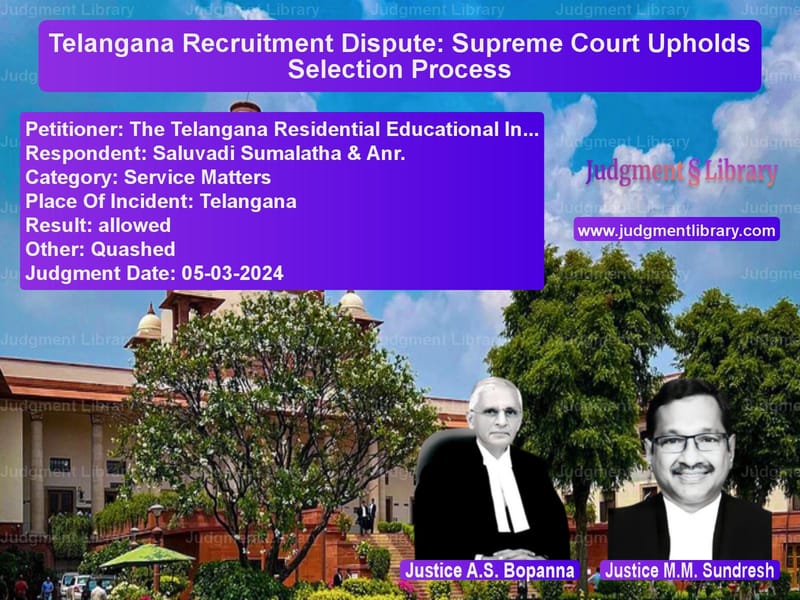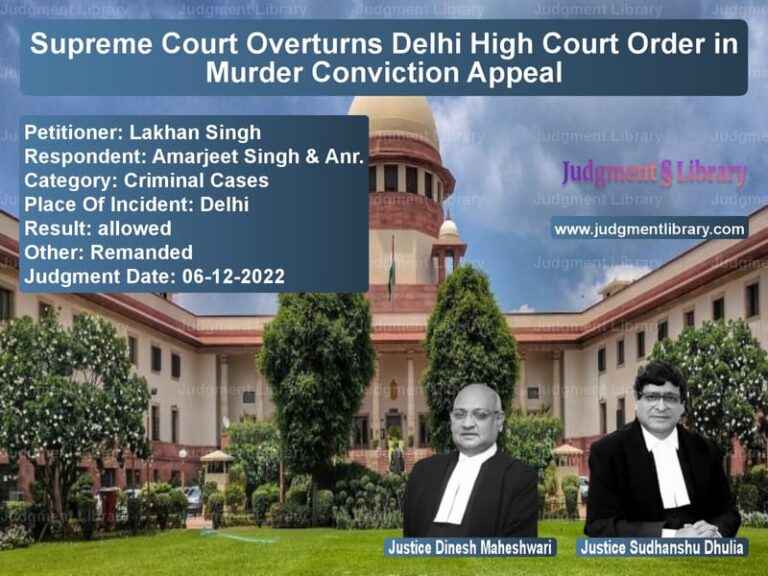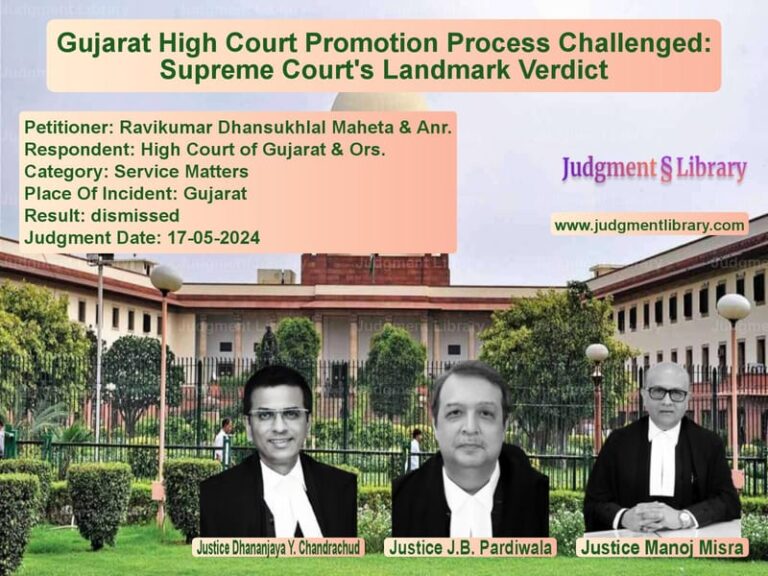Telangana Recruitment Dispute: Supreme Court Upholds Selection Process
The Supreme Court of India has recently ruled on a contentious recruitment dispute in the case of The Telangana Residential Educational Institutions Recruitment Board vs. Saluvadi Sumalatha & Anr.. The case involved the legality of the selection process for junior lecturer positions in Telangana’s Residential Educational Institutions and the interpretation of local and non-local reservation policies.
Background of the Case
The Telangana Residential Educational Institutions Recruitment Board issued a notification on July 31, 2018 (Notification No. 03/2018) to recruit junior lecturers for various Residential Educational Institutions Societies in Telangana. The selection process was governed by the Andhra Pradesh Public Employment (Organisation of Local Cadres and Regulation of Direct Recruitment) Order, 1975 (also known as the Presidential Order), as amended by subsequent government orders.
The key recruitment provisions included:
- 30% of posts to be filled based on merit from both local and non-local candidates.
- 70% of posts reserved for local candidates.
- Scheduled Caste (Women) candidates were assigned a specific reservation at Roster Point No. 2.
The dispute arose when Respondent No. 1, Saluvadi Sumalatha, who ranked 49th in the merit list, challenged the selection of Respondent No. 2, who ranked 35th but had listed Zone VI as her second preference.
Legal Issues
- Whether the recruitment board correctly followed the 30:70 ratio for local and non-local reservations.
- Whether a candidate could be selected for a zone that was not their first preference.
- Whether the High Court erred in setting aside the recruitment and ordering a re-drawing of the merit list.
Arguments by the Appellant (Recruitment Board)
The Telangana Residential Educational Institutions Recruitment Board argued that:
- The recruitment process was conducted strictly per the Government Order No. 124 (March 7, 2002), which mandated a 30:70 division between local and non-local candidates.
- Respondent No. 2, despite listing Zone VI as her second preference, was still eligible for selection in that zone as per the notification’s preference-based allocation system.
- The High Court’s ruling in favor of Respondent No. 1 ignored the legally established recruitment methodology.
Arguments by the Respondents
Respondent No. 1 contended that:
- The recruitment board wrongly applied a 30:70 ratio instead of a 40:60 ratio.
- As a local candidate with Zone VI as her first preference, she should have been prioritized over Respondent No. 2, who had listed Zone VI as her second preference.
- The selection of Respondent No. 2 violated the principles of fairness in recruitment.
Supreme Court’s Observations and Judgment
1. Interpretation of the 30:70 Rule
The Supreme Court examined the relevant government orders and held:
“The amendment to G.O.P No. 763, vide GOMs No. 124 (March 7, 2002), makes it clear that 30% of posts meant for both locals and non-locals must be filled first, before proceeding to the remaining 70%.”
The Court criticized the High Court for incorrectly applying a 40:60 ratio instead of the legally mandated 30:70 ratio.
2. Validity of Second Preference Selections
The Court ruled that a candidate was not disqualified from being considered in a second-preference zone, provided they exercised that option:
“A candidate is not non-suited from being considered in another zone subject to the only condition that it should form part of the option that she has exercised.”
Since Respondent No. 2 had listed Zone VI as her second preference, her selection was valid.
3. Deference to Recruitment Agencies
The Supreme Court emphasized that courts should be cautious when interfering in recruitment processes:
“Courts must be slow in interfering with the recruitment process adopted by selection agencies, as these processes involve careful application of rules and regulations.”
The Court cited Dalpat Abasaheb Solunke v. B.S. Mahajan, (1990) 1 SCC 305, which held that courts should not substitute their judgment for that of expert selection committees.
4. Final Ruling
The Supreme Court set aside the High Court’s judgment and reinstated the recruitment of Respondent No. 2:
“The recruitment board has correctly followed the mandate of law. Accordingly, the impugned order is set aside, and the appeals stand allowed, restoring the recruitment made in favor of Respondent No. 2.”
Implications of the Judgment
This ruling has significant implications for future recruitment processes:
- Reaffirms the validity of the 30:70 reservation rule: Ensures uniform application in public employment.
- Clarifies the role of preference-based selection: A second-preference candidate is not automatically ineligible.
- Limits judicial interference in recruitment: Courts must defer to expert recruitment agencies unless there is clear illegality.
- Ensures consistency in public employment policies: Reinforces that recruitment rules must be followed as prescribed.
This judgment strengthens the legal framework governing recruitment in government educational institutions and upholds the importance of merit-based selection while maintaining reservation policies.
Petitioner Name: The Telangana Residential Educational Institutions Recruitment Board.Respondent Name: Saluvadi Sumalatha & Anr..Judgment By: Justice A.S. Bopanna, Justice M.M. Sundresh.Place Of Incident: Telangana.Judgment Date: 05-03-2024.
Don’t miss out on the full details! Download the complete judgment in PDF format below and gain valuable insights instantly!
Download Judgment: the-telangana-reside-vs-saluvadi-sumalatha-&-supreme-court-of-india-judgment-dated-05-03-2024.pdf
Directly Download Judgment: Directly download this Judgment
See all petitions in Recruitment Policies
See all petitions in Public Sector Employees
See all petitions in Judgment by A. S. Bopanna
See all petitions in Judgment by M.M. Sundresh
See all petitions in allowed
See all petitions in Quashed
See all petitions in supreme court of India judgments March 2024
See all petitions in 2024 judgments
See all posts in Service Matters Category
See all allowed petitions in Service Matters Category
See all Dismissed petitions in Service Matters Category
See all partially allowed petitions in Service Matters Category







